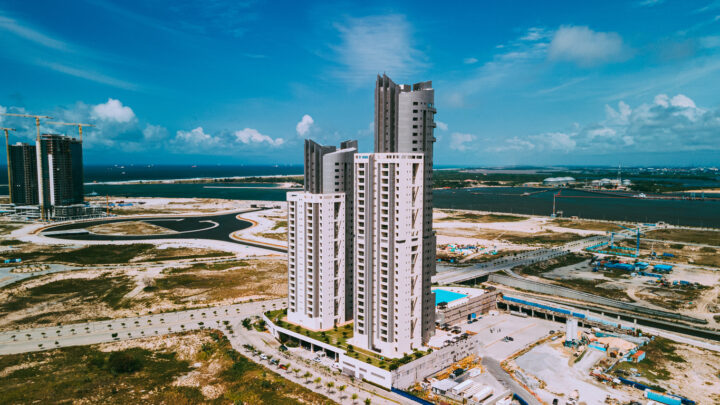The price of land in Eko Atlantic City, Lagos, has reached a new peak, with reports indicating that plots are now being sold for over ₦2 billion each. The upscale development, which has steadily attracted both local and international investors since its inception, is increasingly being recognized as one of the most valuable real estate enclaves in Nigeria.
The dramatic rise in land valuation in this coastal city is being attributed to the growing interest from high-net-worth individuals and institutions seeking exclusive investment opportunities in the heart of Lagos.

Eko Atlantic, a sprawling city built on reclaimed land from the Atlantic Ocean, was designed to provide a modern and secure environment for business, residential, and recreational purposes. With its strategic location near Victoria Island and Lekki, and its promise of high-quality infrastructure, the project has captured the imagination of property investors over the past decade. Originally conceived to solve Lagos’ chronic land shortage and coastal erosion issues, the city has grown into a symbol of luxury and affluence.
Real estate experts have pointed out that the land prices in Eko Atlantic have risen by more than tenfold over the past two decades. In the early 2000s, a plot of land could be acquired for under ₦200 million. Today, market sources confirm that similar plots are now commanding prices in excess of ₦2 billion, depending on their size and proximity to key infrastructure such as the marina, business district, and entertainment hubs. This exponential growth is reflective of the area’s prestige and limited availability.
Industry professionals say the sharp appreciation in land value is also linked to Eko Atlantic’s status as a special economic zone. As such, businesses and investors enjoy incentives including tax benefits, enhanced security, and access to premium utilities such as underground power and sewage systems. The city also boasts international-standard road networks and fiber optic communications, all of which contribute to its high valuation.
In recent years, demand has been driven largely by Nigerians in the diaspora, multinational corporations, and investment firms. With rising inflation and economic uncertainties, real estate in Eko Atlantic has become a preferred hedge against currency devaluation and market volatility. Landed property in the city is increasingly being viewed not just as a status symbol but as a reliable store of wealth, especially in the face of persistent macroeconomic instability.
Furthermore, the emergence of Eko Atlantic as a business hub has played a major role in its growing attractiveness. Several global brands, including banks and telecommunications companies, have either relocated or expressed interest in establishing their offices within the city. The presence of luxury hotels, retail spaces, and conference centers has also added to the allure, making the city an integrated destination for commerce and leisure.
Despite the buoyant market, some analysts have cautioned about the potential risks associated with such rapid price increases. There are concerns that the market could become overheated, especially if speculative buying outpaces genuine demand. However, stakeholders in the property sector remain optimistic, arguing that the demand is based on real economic fundamentals, including urban expansion, population growth, and the desire for secure, high-end living.
The rise in land prices in Eko Atlantic has also had a ripple effect on surrounding areas such as Victoria Island, Lekki Phase 1, and Oniru, where property values have experienced notable appreciation. Investors who missed early opportunities in Eko Atlantic are now looking to these neighboring districts, pushing up land and rental prices across the Lagos Island axis. As a result, the entire region is undergoing a transformation, with new residential and commercial developments springing up to cater to the growing demand.
However, while Eko Atlantic symbolizes luxury and high returns, it also raises questions about accessibility and affordability. Many real estate developers and advocacy groups have expressed concern that the city, though impressive in its planning and execution, remains largely inaccessible to the average Nigerian. With Nigeria facing a housing deficit estimated at over 20 million units, critics argue that more inclusive housing policies are needed to ensure that such projects contribute to broader urban development goals.
Nonetheless, the trajectory of Eko Atlantic’s land market is a strong indicator of the evolving dynamics in Nigeria’s real estate sector. As more investors seek secure and high-yielding opportunities, the city is likely to remain at the forefront of luxury real estate in West Africa. For now, its soaring land values and infrastructure development continue to position it as a benchmark for high-end urban planning and investment in the region.
Support InfoStride News' Credible Journalism: Only credible journalism can guarantee a fair, accountable and transparent society, including democracy and government. It involves a lot of efforts and money. We need your support. Click here to Donate
